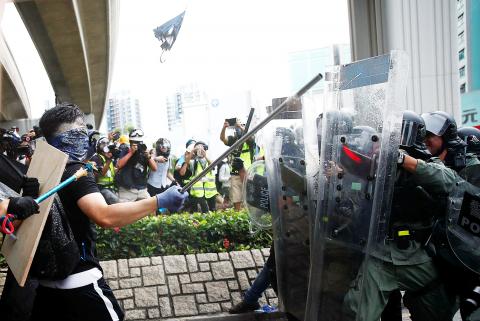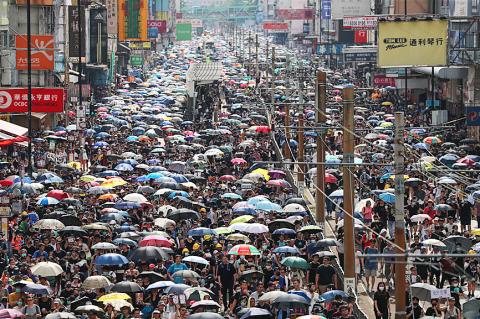Hong Kong police yesterday fired tear gas at protesters holding a banned rally against suspected triad gangs who beat up pro-democracy demonstrators near the Chinese border on Sunday last week.
Riot police fired dozens of rounds of tear gas in Yuen Long after tense standoffs with protesters, some of whom were throwing projectiles and had surrounded a police van.
Public anger has been raging since Sunday, when a gang of men in white T-shirts, armed with poles and batons, set upon protesters and bystanders in Yuen Long Station.

Photo: Reuters
Police have been heavily criticized for being too slow to respond to Sunday’s violence, fueling accusations of collusion or turning a blind eye — allegations the force has denied.
Yesterday’s violence compounds the political crisis with the territory’s pro-Beijing leadership seemingly unable — or unwilling — to end the chaos.
Yuen Long is in Hong Kong’s New Territories, a rural area where many of the surrounding villages are known for triad connections and their staunch support for the pro-Beijing establishment.

Photo: EPA-EFE
Police say they have arrested 12 people so far in connection with Sunday’s violence, nine of whom have known triad links.
The white shirt mob ran into two villages near Yuen Long MTR Station after their attack and later left without police making any arrests, despite a large presence of officers.
These two villages became the focus of protester anger yesterday.
The rally began peacefully, but small groups, many in helmets and carrying shields, confronted police outside the villages and accused them of protecting triads.
Tensions soon escalated with projectiles hurled and a police van containing officers surrounded and daubed in graffiti.
Soon tear gas rounds were arcing through the air and a now-familiar pattern of running battles between police and protesters began.
Throughout the afternoon protesters formed shield walls of umbrellas, scattering each time new volleys of tear gas came their way.
In a rare move, police banned the rally, saying that they feared reprisal attacks against villagers from protesters, a decision that only heightened anger toward a force already perceived to be protecting pro-government aggressors.
Social messaging channels used to organize the largely leaderless movement quickly filled up with calls for people to have a “shopping spree” in Yuen Long or play Pokemon Go there.
Crowds spilled out of Yuen Long’s main station in the afternoon as the illegal march began peacefully. Many shops were shuttered.
“Every one of us came here on our own initiation,” a 25-year-old medical worker surnamed Ng said. “So I don’t think this is an illegal assembly. I’ve just come here as an individual to tell people my thoughts.”
Weeks of protests with huge turnouts have had little luck persuading Beijing or Hong Kong’s leaders. Beijing has issued increasingly shrill condemnations, but has left it to the territory’s government to deal with the situation.
Hong Kong Chief Executive Carrie Lam (林鄭月娥) has shown no sign of backing down beyond agreeing to suspend the extradition bill.
Protesters also plan to march today through a district where riot police fired tear gas and rubber bullets at projectile-hurling protesters the week before.
Police have allowed a rally to take place, but denied protesters permission to march, raising the likelihood of further confrontations.

FALSE DOCUMENTS? Actor William Liao said he was ‘voluntarily cooperating’ with police after a suspect was accused of helping to produce false medical certificates Police yesterday questioned at least six entertainers amid allegations of evasion of compulsory military service, with Lee Chuan (李銓), a member of boy band Choc7 (超克7), and actor Daniel Chen (陳大天) among those summoned. The New Taipei City District Prosecutors’ Office in January launched an investigation into a group that was allegedly helping men dodge compulsory military service using falsified medical documents. Actor Darren Wang (王大陸) has been accused of being one of the group’s clients. As the investigation expanded, investigators at New Taipei City’s Yonghe Precinct said that other entertainers commissioned the group to obtain false documents. The main suspect, a man surnamed

DEMOGRAPHICS: Robotics is the most promising answer to looming labor woes, the long-term care system and national contingency response, an official said Taiwan is to launch a five-year plan to boost the robotics industry in a bid to address labor shortages stemming from a declining and aging population, the Executive Yuan said yesterday. The government approved the initiative, dubbed the Smart Robotics Industry Promotion Plan, via executive order, senior officials told a post-Cabinet meeting news conference in Taipei. Taiwan’s population decline would strain the economy and the nation’s ability to care for vulnerable and elderly people, said Peter Hong (洪樂文), who heads the National Science and Technology Council’s (NSTC) Department of Engineering and Technologies. Projections show that the proportion of Taiwanese 65 or older would

Democracies must remain united in the face of a shifting geopolitical landscape, former president Tsai Ing-wen (蔡英文) told the Copenhagen Democracy Summit on Tuesday, while emphasizing the importance of Taiwan’s security to the world. “Taiwan’s security is essential to regional stability and to defending democratic values amid mounting authoritarianism,” Tsai said at the annual forum in the Danish capital. Noting a “new geopolitical landscape” in which global trade and security face “uncertainty and unpredictability,” Tsai said that democracies must remain united and be more committed to building up resilience together in the face of challenges. Resilience “allows us to absorb shocks, adapt under

Taiwan Semiconductor Manufacturing Co (TSMC, 台積電) yesterday said it is building nine new advanced wafer manufacturing and packaging factories this year, accelerating its expansion amid strong demand for high-performance computing (HPC) and artificial intelligence (AI) applications. The chipmaker built on average five factories per year from 2021 to last year and three from 2017 to 2020, TSMC vice president of advanced technology and mask engineering T.S. Chang (張宗生) said at the company’s annual technology symposium in Hsinchu City. “We are quickening our pace even faster in 2025. We plan to build nine new factories, including eight wafer fabrication plants and one advanced